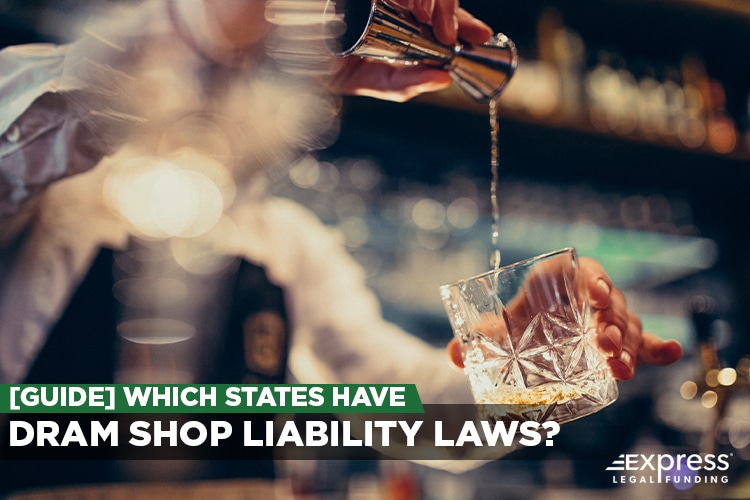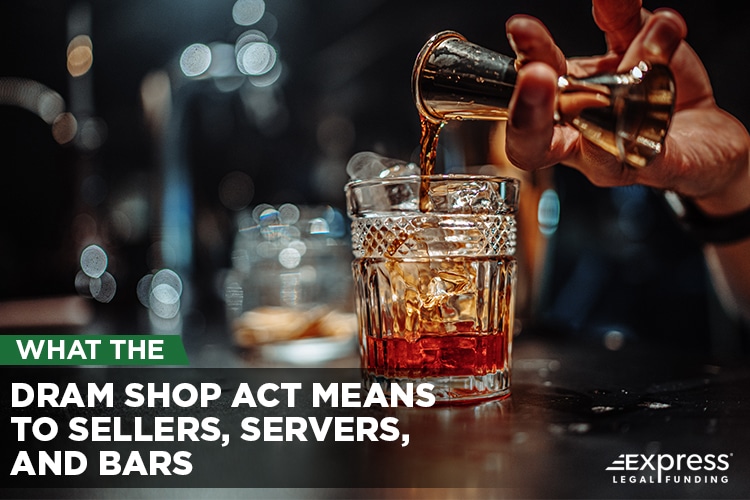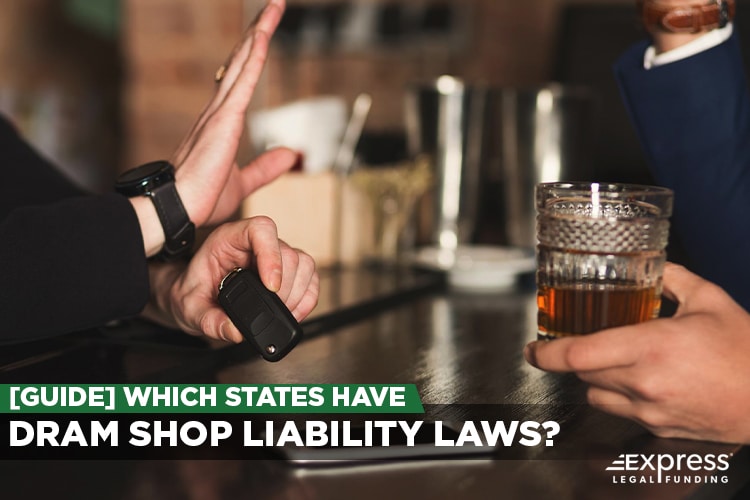
There is a misconception among some that the laws they are familiar with are applicable across the country. However, this is not entirely true. While there are many federal regulations about certain practices, the rest depend on each state’s laws created and enforced.
This state-by-state legal enforcement extends to the rules surrounding Dram Shop laws and liability.
While it is hardly realistic to expect every American citizen to be intimately familiar with every state-exclusive regulation, a few are worth learning, especially regarding the laws regarding responsibility for accidents that occur while under the influence of alcohol.
In this article, we will be listing each state that has Dram Shop liability laws.
What Are Dram Shop Liability Laws?
Now, you might need a little clarification on what exactly Dram Shop liability laws are and how they relate to alcohol. The answer is straightforward.
Let us say that someone enters a bar and proceeds to become intoxicated by imbibing copious amounts of their alcohol of choice. Despite the customer being quite obviously drunk, the bartender allows the intoxicated person to leave the bar, knowing they intend to operate a motor vehicle.
Then, that same intoxicated patron causes a collision that severely harms the other driver. A dram liability law would make it so that not only the driver responsible would be held liable, but so would the facility responsible for their intoxication.
The term “dram” liability refers to the measurement unit used when alcohol is sold. The name is apropos, given that a single dram could be all that stands in the way of a bar’s patron causing a crash.
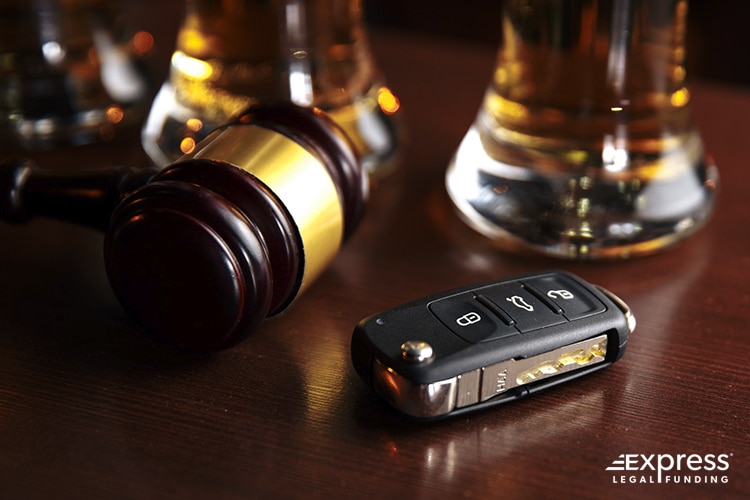
These laws would seem like an excellent method for helping to keep the number of drunk driving incidents low, but they are not always as straightforward as they might seem.
In addition, there is an addendum to dram shop liability laws known as social host liability laws that applies to non-commercial hosts who allow the illegal consumption of alcohol or allow a visibly intoxicated guest to continue drinking without preventing them from driving.
Additionally, dram liability laws are not present in all 50 states. The only federally enforced law regarding facility liability for serving alcohol is the law against serving alcohol to minors. Believe it or not, it is easier to list the states that do not actively enforce Dram Shop liability laws. What states do not have Dram Shop Laws?
States With No Dram Shop Laws:
- Delaware
- Kansas
- Louisiana
- Maryland
- Nebraska
- Nevada
- South Dakota
- Virginia
Nevertheless, keeping the goal of this being an in-depth guide in mind, here is the complete list of states with Dram Shop laws: What states have Dram Shop laws?
States With Dram Shop Laws [Infographic]:
Alabama, Alaska, Arizona, Arkansas, California, Colorado, Connecticut, Florida, Georgia, Hawaii, Idaho, Illinois, Indiana, Iowa, Kentucky, Maine, Massachusetts, Michigan, Minnesota, Mississippi, Missouri, Montana, New Hampshire, New Jersey, New Mexico, New York, North Carolina, North Dakota, Ohio, Oklahoma, Oregon, Pennsylvania, Rhode Island, South Carolina, Tennessee, Texas, Utah, Vermont, Washington, West Virginia, Wisconsin, Wyoming
The District of Columbia (Washington DC) isn’t on this list, as it isn’t a state. However, Washington, DC, does have Dram Shop laws as well.
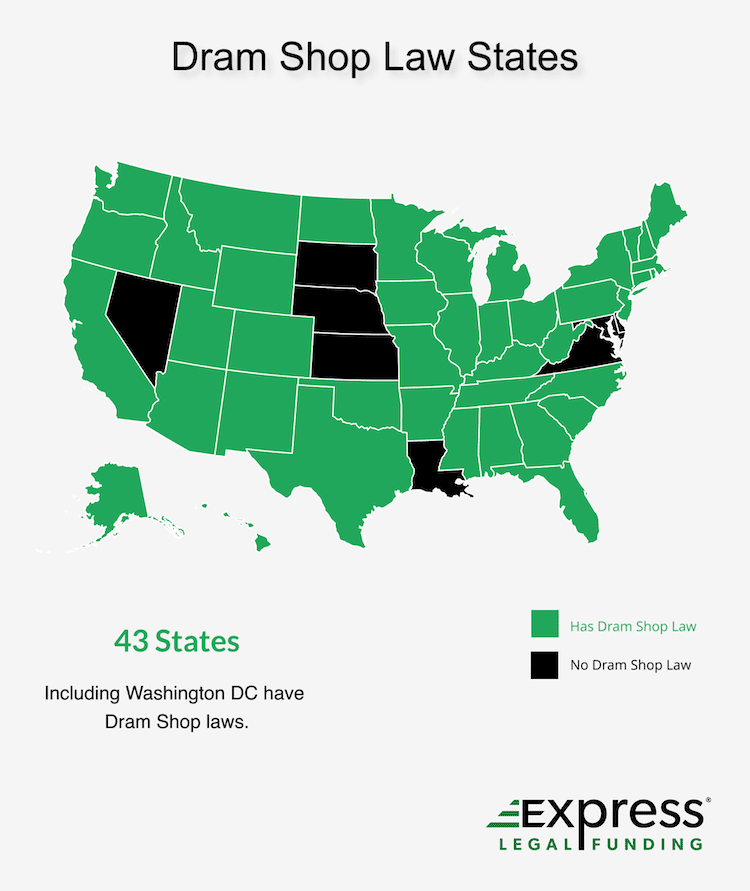
Louisiana is intriguing because it has legislation actively opposing Dram Shop liability claims. Aside from these states, the rest of the country has Dram Shop liability laws enforced to some capacity.
However, the specifics of each state’s enforcement of the regulations will vary as per the election process and passing of state legislation.
States With Social Host Liability Laws [Infographic]:
Social host liability laws make non-commercial entities liable for overserving guests. Similar to the Dram Shop Act, the primary goal is to cut down on alcohol access available to minors and drunk driving accidents involving minors by making hosts of parties where alcohol is served wary of their guests leaving drunk. Social hosts can be held financially accountable for the harm their drunk guests cause to third parties after leaving the party.
States that make social hosts liable for overserving guests:
Alabama, Alaska, Arizona, Arkansas, California, Colorado, Georgia, Hawaii, Idaho, Illinois, Indiana, Iowa, Louisiana, Maine, Massachusetts, Michigan, Minnesota, Mississippi, Montana, Nebraska, Nevada, New Jersey, New Mexico, New York, North Dakota, Oregon, South Dakota, Texas, Utah, Vermont, Wisconsin, Wyoming
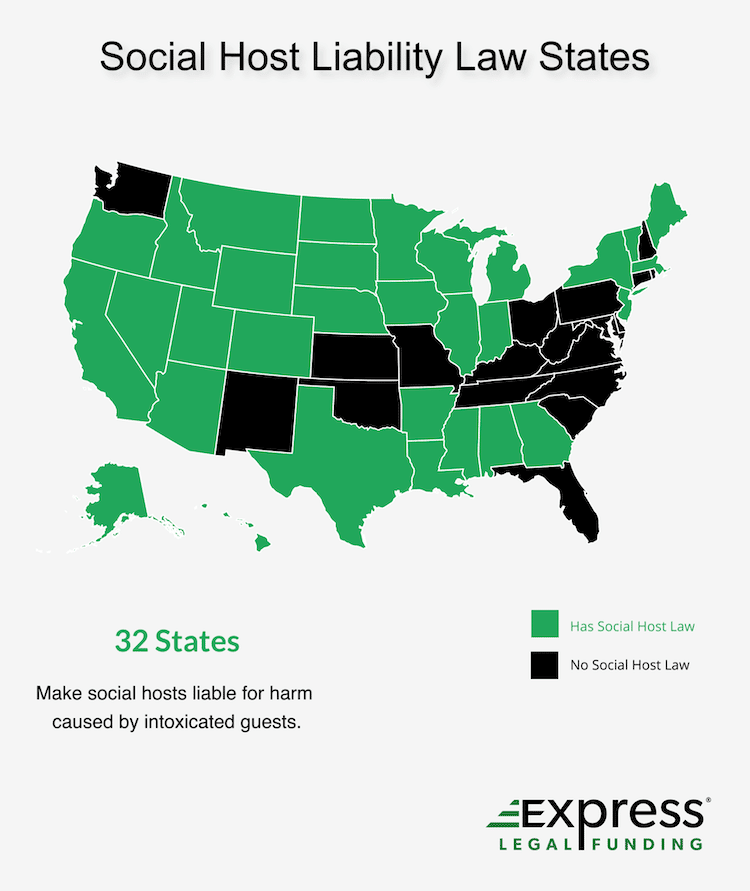
States With Social Host Laws Only For Minors:
Although it is illegal to serve alcohol to minors in all 50 states, there are states which have additional social host liability laws with criminal penalties for hosting underage drinking.
States that have social hosts laws for minors that carry criminal penalties:
Alabama, Alaska, Arizona, Arkansas, California, Connecticut, Florida, Illinois, Kansas, Maine, Maryland, Massachusetts, Michigan, Mississippi, Missouri, New Hampshire, New Jersey, North Dakota, Ohio, Oklahoma, Oregon, Pennsylvania, Rhode Island, South Carolina, South Dakota, Tennessee, Utah, Virginia, Washington, Wisconsin, Wyoming
With over 40 states enforcing Dram Shop liability laws, it would be nearly impossible to cover every state’s laws in this article. However, we will be outlining a few in this article.
Are There Dram Shop Liability Laws in Missouri?
Yes, Missouri, along with the majority of the country, does have legislation enforcing Dram Shop liability. Like all states enacting Dram Shop liability, it also has specific qualifiers before you can file a claim against a bar or tavern responsible for the intoxicated state of a driver.
The actual process of filing a claim involves seeking damages against the dispenser of the alcohol for their role in the collision. Their role resulted from the negligence of their staff that allowed the driver to return to their vehicle unimpeded.
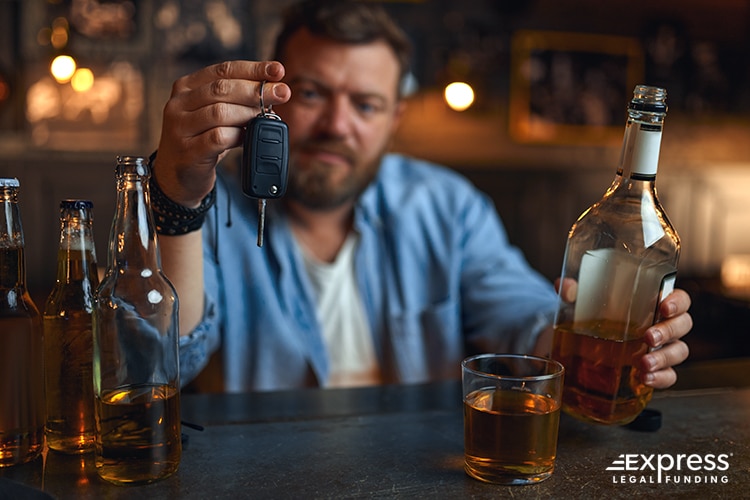
The two Dram Shop law qualifiers that Missouri enforces are:
- The staff should know whether or not the individual was under the legal drinking age of 21 years and not sell them any alcohol if they are underage.
- If the staff determines the patron is visibly intoxicated, they must cease the sale of alcohol to that patron and prevent them from operating a motor vehicle.
While the concept of being “visibly intoxicated” can be ambiguous, to say the very least, Missouri does offer some qualifications to make the distinction a little simpler. According to Missouri Dram Shop liability law, the term “visibly intoxicated” is described as “inebriated to such an extent that the impairment is shown by significantly uncoordinated physical action or significant physical dysfunction.”
This definition means that a patron stumbling their way around the bar or having difficulty standing up straight is visibly intoxicated. Therefore, they should have their supply cut off and their keys confiscated to avoid a DUI and a hazardous situation.
Let us say that the intoxicated patron is observed demonstrating the state definition of being visibly intoxicated. Still, the bartender serves them alcohol and does nothing to prevent them from driving. They then cause a car accident that results in grievous injuries or fatalities to the other drivers.
Under Missouri law, the other driver can file a personal injury claim against the patron and file a Dram Shop claim against the bar for damages because the bartender did not cut the patron off or confiscate their keys to prevent them from driving.
While Missouri does maintain Dram Shop liability laws, it does not enforce social host liability laws.
What Are the Dram Shop Liability Laws in Texas?
Texas, like Missouri, also has Dram Shop liability laws. Texas has exceptionally similar qualifiers that apply to the laws to make Dram Shop claims justifiable.
However, Texas does have its unique descriptors that are important to whether or not an individual harmed in a drunk driving accident might pursue a lawsuit against the bar under the state statutes. These qualifiers include a slight adjustment to the definition of what being visibly intoxicated includes.
According to Texas state law, being visibly intoxicated requires that the patron is “obviously intoxicated to the extent that he presented a clear danger to himself and others.”
While the change is minor in the grand scheme of visible intoxication, it can mean the difference between simply suing over a drunk patron and simple negligence. This distinction is compounded by Texas law specifying that intoxication has to be the reason for the collision. Any bar patron who only had a single beer does not bring consequences to the bar for having alcohol on their breath.
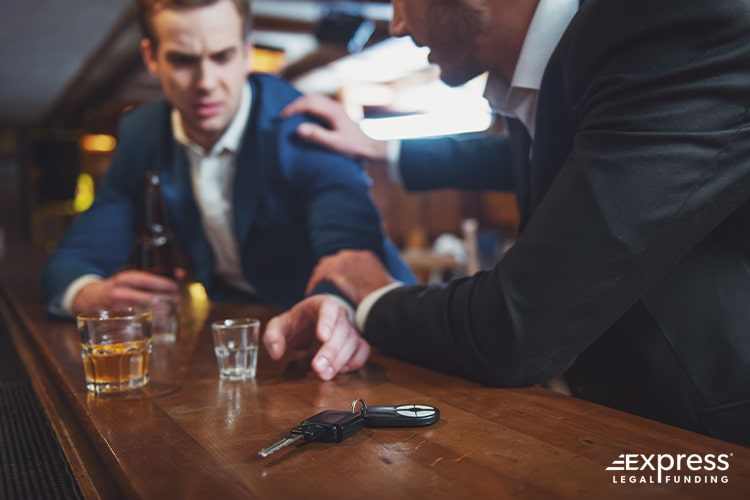
Texas’s most significant difference compared to Missouri is that Texas has social host liability laws and Dram Shop liability. This distinction is important because it gives a good cause of action in negligence by citizens and institutions for intoxication that could and should have been averted.
For example, let us pretend that a Texas man is hosting a bachelor party where alcohol is being served. One of the guests happens to be an 18-year-old who has enjoyed the alcoholic beverages with the host’s awareness, but the host does nothing to prevent his underaged guest from drinking them. When the 18-year-old guest leaves and causes a car accident on the drive home, the victims can pursue both the host and the intoxicated teenager for their injuries and damages.
These laws are designed to prevent the allowance of dangerous intoxication or underage intoxication within private residences, leading to injury or loss of life.
What Are the Dram Shop Liability Laws for Louisiana?
We noted before that not every state has legislation allowing for Dram Shop liability laws to be put into effect. The absence of such laws can lead to a lack of accountability in some ways, but the states retain the right to make those determinations independently.
What distinguishes Louisiana from these states is that the Louisiana legislature has passed anti-Dram Shop liability legislation to actively prohibit any attempts to seek damages against a bar or tavern whose patrons cause a collision.
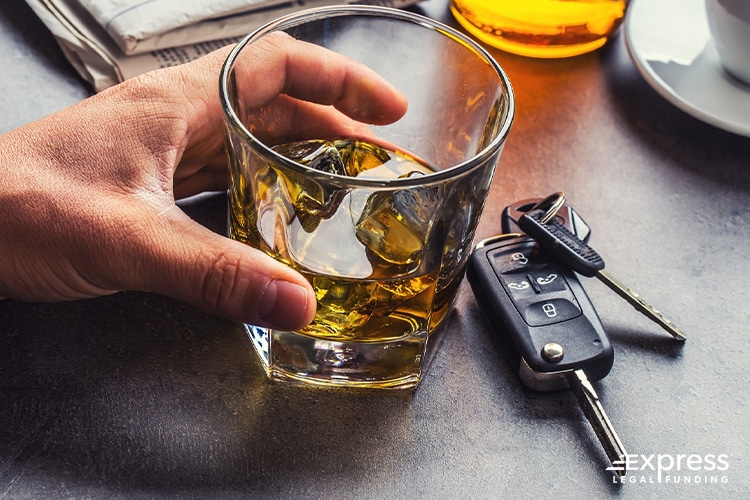
Louisiana’s legislation actively states that licensed vendors of alcohol cannot be held accountable for the actions of their patrons once they have left the premises of the establishment.
However, if an underage patron manages to purchase and become intoxicated by alcohol sold by a liquor store, they are no longer shielded from civil liability. The only thing that alcohol retailers can be held responsible for when it comes to the effects of their products on patrons is when the individual is below the federal drinking age.
So, while Louisiana lacks Dram Shop liability for legal adults aged 21 or older, laws apply to minors intoxicated under their watch. The situation is identical to social host liability laws.
Suppose a social guest becomes intoxicated while visiting a friend and causes a collision while driving home. In that case, the host is protected from liability, even if they are responsible for over-serving their guest.
However, if the guest is underage, the shield is dropped, and the host is liable for the minor’s intoxication and damages.
What Are the Universal Limitations of Dram Shop Liability?
While each state might have specific definitions for visible intoxication or other factors that would permit Dram Shop or social host liability claims from being filed, there are some universal factors.
First, as with many legal conflicts, Dram Shop Acts and social host liability have statutes of limitations that prevent claims from being filed long after the incident’s relevance.
A statute of limitations provides a timeframe for the claims to be filed. If they are not filed within that time frame, you lose the chance to file at all.
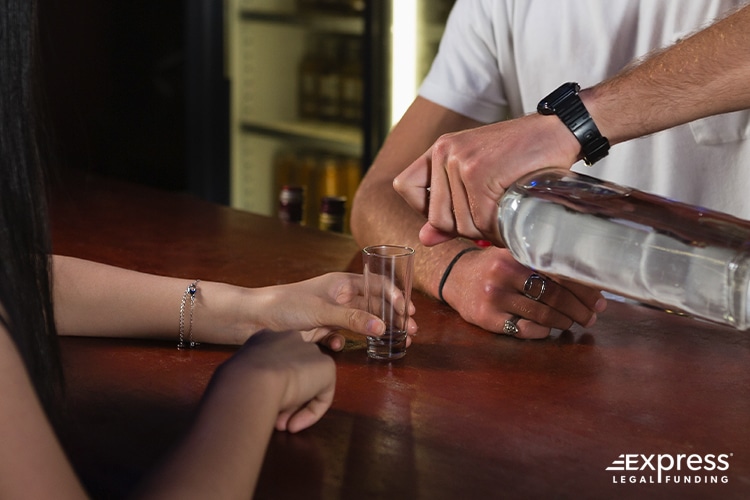
Each state has its statutes of limitations, meaning there is some divergence:
- Missouri allows the claim to be filed within five years of the incident.
- Texas allows the claim to be filed within two years of the incident.
- Louisiana allows claims involving intoxicated minors only to be filed within one year of the incident.
While each state will have different time limits, the basic principle is the same. If you do not file within their allotted timeframe, you can no longer file at all. Additionally, each state restricts what damages can be pursued following a collision with an intoxicated driver. In general, both dram shop and social host claims only allow you to pursue the costs for:
- Medical bills
- Lost wages
- Damaged property
- Pain and suffering
There are a few other divergences between the states regarding the damages, but these are some universal factors across state lines. Akin to the same principle as a standard personal injury claim.
Dram Shop and Liquor Liability Laws
Unfortunately, Dram Shop liability laws are not a universal measure across the country. However, in the states where it is available as a form of legal recourse, it can be an excellent way to minimize the number of repeat incidents.
With the number of drunk driving accidents across the country, it is hard to claim that dram shop liability and social host liability are enough to stem the tide entirely, but it offers an interesting opportunity.
The main concern is making you aware of the concepts as a whole to be made aware of the potential avenues you have in specific states should you become involved in a drunk driving accident, even if you were the drunk driver.
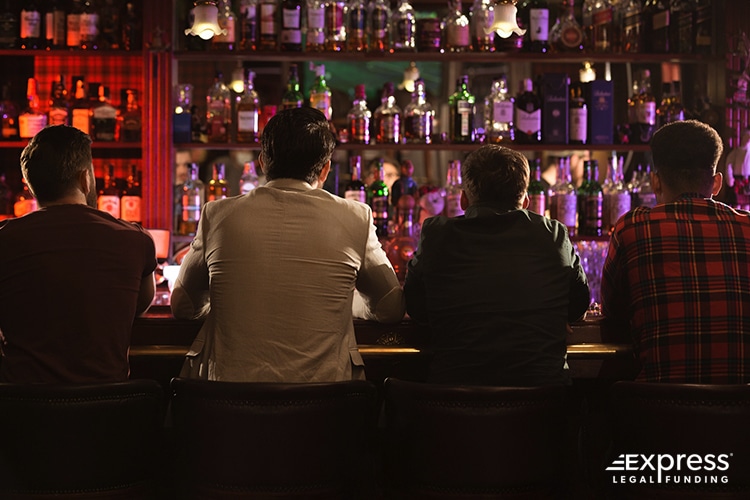
If you have been a victim of a motor vehicle accident caused by drunk driving of an intoxicated individual, you might find yourself during a lengthy and tiresome legal battle. Unexpected medical costs can make it challenging to maintain your daily cost of living until your case has finally come to an end.
If you, like many people involved in a Dram Shop case, are behind on your bills, you might want to consider applying for pre-settlement funding. It’s a cash advance that can be used for essentials like rent or mortgage payments.
So you don’t have to settle your case too early due to financial pressures, allowing your dram shop lawyer to get you the fair settlement you deserve. You are selling a piece of your potential settlement or trial award in exchange for the pre-settlement cash you need now. So, the best part about legal funding is that those funds are only repaid if you settle or win your Dram Shop case.
Our team at Express Legal Funding has experience providing pre-settlement funding on Dram Shop claims. So, if you have a Dram Shop case and need some of your settlement cash now, we are here to help answer your questions and help you start the legal funding process. (It’s important to note in Missouri, as a licensed lender, we can only provide pre-settlement loans, which are not non-recourse and technically must be repaid by law win or lose your Dram Shop case.)

